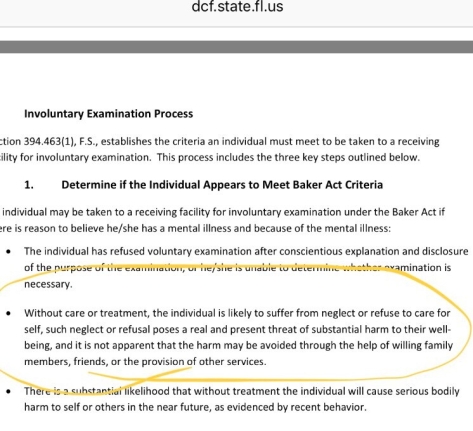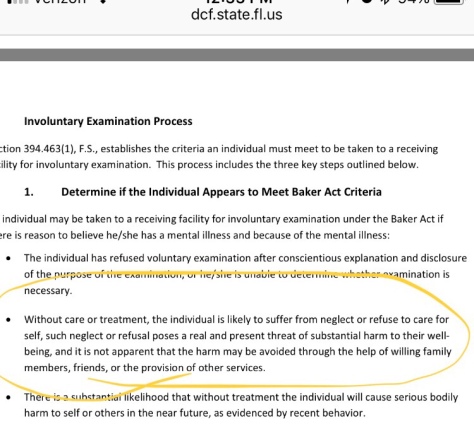Another 8 year old was just “Baker Acted” in my county.
I want to say bad words.
Instead, I’ll take this opportunity to share what I have learned the hard way to help prevent psychiatric institutionalizing from happening to anyone else.
It’s not fail safe, and I am not an attorney.
I am a mom who is angry, sick and scared that parents of children with special needs not only have to worry about IEP meetings, social skills, physical care, emotional well being of their children but ALSO they have to worry about an overzealous person removing the child unnecessarily from their home.
I get it: Sometimes Baker Acts are necessary. This act exists to protect a person who is danger of physically hurting themselves or someone else. AND the law also states that this is only to be enacted if “it is not apparent that the harm may be avoided through the help of willing family members, friends, or the provision of other services.”

So here is what I have done to help prevent a Baker Act in the future.
- I met with school staff to explain my child’s diagnoses and behaviors. A school employed behavior analyst walked the staff and teachers through my child’s Behavior Intervention Plan. I explained that my family can and will supervise my child 24/7, we have no weapons in the home, my child is under regular care of a psychiatrist and we have resources to hospitalize him other than the awful county facility should we agree he need hospitalization.
- An attorney friend sent me the website of the Citizens Commissions on Human Rights on preventing Baker Acts, which has helped me with step #3.
- I filled out and had the form from the website above^^ notarized, and put in my child’s school file after the guidance counselor signed acknowledgement of receiving this. I keep a copy, too.
- I scheduled a meeting with the school resource officer. I brought a copy of my son’s IEP and Behavior Intervention Plan. I spent an hour talking to him about my son’s behaviors, what to do if he had a meltdown, and gave him a copy of the notarized form from #2 and 3 above. I talked about our ability to care for him, our family support, and that we have insurance and resources to choose which hospital our child should go to if it was necessary. I made it clear that we would employ litigation if my son was Baker Acted unnecessarily. The SRO thanked me and suggested all parents of children with autism or behavior difficulties should take the time to meet with SROs.
- I let the IEP Team and the SRO know that the SRO is not to become a preferred person for my child. The less interaction, the better, per our advocate from Florida Disability Rights.
- At our IEP Meetings, our amazing advocate reminds the team that a Baker Act for a child who has known statements and behaviors consistent with autism is inappropriate. Autism is a developmental disorder, NOT a mental health disorder.
- I check in via email weekly with school personnel, so they know I am continuing to be involved even if I am not physically present at the school.
- One thing I would *like* to have in place is a psychiatrist willing to sign release on Baker Acts in the future. Our current provider will not involve himself in “legal cases”. I’m working on changing providers, because I think it’s really important to have this “Uno Wild” card just in case. A psychiatrist is the only person with legal authority to sign a child out of a Baker Act situation once the process has been initiated.
- I pray daily for my child and the people who surround my child. God can cover what I can’t.
What do you do to help prevent this? I’d love to hear your ideas.






